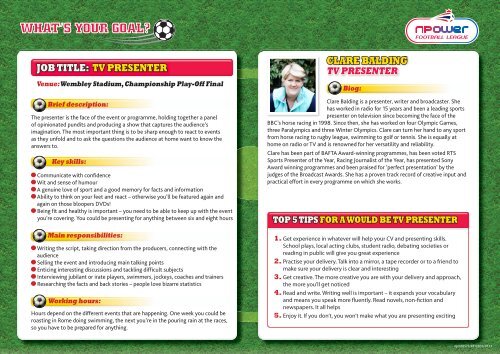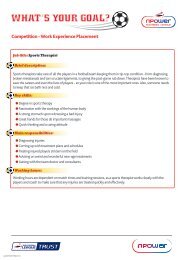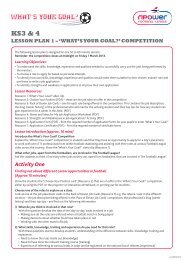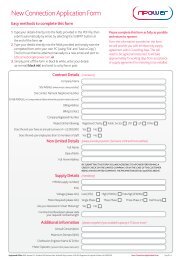JOB TITLE: TV PRESENTER CLARE BALDING - Npower
JOB TITLE: TV PRESENTER CLARE BALDING - Npower
JOB TITLE: TV PRESENTER CLARE BALDING - Npower
Create successful ePaper yourself
Turn your PDF publications into a flip-book with our unique Google optimized e-Paper software.
<strong>JOB</strong> <strong>TITLE</strong>: SPORTS PHOTOGRAPHERVenue: Championship Play-off Final, Wembley StadiumBrief description:A sports photographer is required to be alert and concentrate for the duration of thegame, to know what to send to the desk at half time and after the match and finallyto be able to capture the match’s key moments with fast reactions.Key skills:Photography!A good level of skill on photoshop for editing picturesGood typing and computing skills for captioning your imagesHigh levels of concentration and quick reactionsCreativity – you want your shot to stand out from the restMain responsibilities:Photographing all the key elements of a matchKeeping an eye out for any additional things going on that may make a storyMaking sure your paper has the images in time for printCapturing ‘the’ image of the matchWorking hours:Working hours vary as to the needs of the job. There are no set hours so expect towork at all times of the day according to which matches need covering.GEORGIE GILLARDSPORTS PHOTOGRAPHERBiog:Aged 15 Georgie did her first work experience placementwith a sports photographer at Northampton Town footballclub, following this she did another week working witha photographer at the Chronicle and Echo newspapers covering football, golf andcricket. This experience gave Georgie ‘the bug’ and the drive to aim to work for anewspaper as a career.After studying A-Level photography, Georgie went on to do a photography degreeat Portsmouth University, where she volunteered to do the sports photography forthe university teams. Georgie took an opportunity to work at a football summercamp in Barcelona, photographing teams of all ages whilst they competed forthe Catalonian cup. In Georgie’s final year she worked on a project regardingfemale footballers spending time photographing the university team to show theirinvolvement in a largely male dominated game.Once graduated, Georgie applied for the position of trainee photographer at theDaily Mail. Georgie still keeps up with her interest in sport and assists on shoots forthe chief sports photographer at the Daily Mail.TOP 5 TIPS FOR A WOULD BE SPORTS PHOTOGRAPHER1. Practise lots!! Take pictures of anything you find interesting, select thegood ones and build up a portfolio of work at the same time2. Learn what makes a good photograph. Research photos in newspapers/magazines and see which styles suit each publication3. Know your subject. Swot up on the major players, the story behind thegame and the rules so you can spot incidents as they happen. You’ll havea better chance of getting ‘the’ photo of the match4. Be prepared. Make sure to have the right equipment and it works so youcan concentrate on capturing what’s happening5. Be prepared to work. This isn’t a 9 to 5 job! You’re on call 24/7npm10558/RF12789/01.13
<strong>JOB</strong> <strong>TITLE</strong>: GOALKEEPING COACHVenue: Sheffield United FCBrief description:At the heart of every great football team is a great goalkeeper. The goalkeepingcoach is responsible for training and improving the team’s goalkeepers through arange of group and individual training sessions. They are also responsible for scoutingnew players, so are always on the lookout for the next Joe Hart or Petr Cech.Key skills:A love of football and great knowledge of the sportAbility to provide constructive feedback – the positives and the negatives!Great observation skills. It is important to be able to pinpoint areas ofimprovement that you can work on with your teamOrganisational skills – you will need to organise and plan your coaching sessionsMain responsibilities:Devising and delivering training programmes and sessionsObserving players during game and training situationsWorking closely with the coaching and management staffRecord players’ progress and regularly provide feedbackScout, recruit and assess trialists and potential playersWorking hours:Although the goalkeeping coach’s day is very structured, they still need to be ableto adapt their working hours to meet the needs of the team. They may have to workunsociable or long hours any day of the week, especially in the lead up to a match.LEANNE HALLGOALKEEPING COACHBiog:As well as representing England, and still playing at thehighest level, the ‘A’ Licence coach, Leanne Hall is the onlyqualified female in both outfield and goalkeeping and oneof the most qualified coaches in the country. She is alsothe goalkeeping coach to the England Women’s Youth Squads and runs her owncoaching business, Leanne Hall Sports & Goalkeeping School.Leanne studied, and obtained, several multi sport qualifications at LoughboroughUniversity Sports Coaching and Development and uses her experience andknowledge to provide comprehensive and effective goalkeeping coaching andeducational programmes.TOP 5 TIPS FOR A WOULD BEGOALKEEPING COACH1. Get experience. Why not start off by volunteering at your local clubsand schools?2. Get your qualifications done early. You can start these in your teenswith local football clubs. Find out from your local teams how best toachieve these.3. Watch a lot of football. But don’t just watch it, really analyse it. Readcolumns in newspapers and listen to pundits. Live for football and yourpassion will rub off on the players you are coaching.4. Observe other coaches within football and other sports so you can thinkof new ways to make training engaging and interesting.5. A determination to succeed and a competitive edge go a long way. If youare motivated, you will be able to easily motivate your players.npm10545/RF12727/01.13
<strong>JOB</strong> <strong>TITLE</strong>: MANAGING DIRECTORVenue: St George’s Park, Burton on TrentBrief description:The Managing Director’s role is ultimately responsible for the financial andoperational performance of the business. It’s a busy role that requires a hugeamount of multi tasking, focus and leadership from the front.Key skills:See the big picture, think strategically when setting the direction of the businessBe a strong team leader, it’s important everybody in the team understands theirrole in delivering success.Building strong relationships with customers, suppliers and partners acrossthe business.Organised, efficient and a great time manager – you need to be on top of yourgame, focusing on the main business objectives and be prepared to put the hardwork in to deliver.Main responsibilities:Delivering the 4 year business plan, across all of St George’s Park’s profit centers,which includes hotels, sports facilities, medical and sports science education.Ensuring St George’s Park delivers great customer service across its many diversecustomer groups.Raising the awareness of St George’s Park within football, sport and thegeneral public.Continually working to ensure St George’s Park remains at the forefront offootball innovation.Working hours:Hours tend to be unsociable, as St George’s Park has customers 24/7. A usual daywill involve getting down to the ‘day job’ when everyone has gone home. On theplus side, job satisfaction is immense and being part of the future of English footballcouldn’t be more exciting.JULIE HARRINGTONMANAGING DIRECTORBiog:Julie’s first job was at an advertising agency, which sponsoredher through her Chartered Institute of Marketing course in theevenings. Their major clients were in pubs and leisure and thisled Julie to work ‘client side’ at a number of breweries and pub companies from juniormarketing positions up to Marketing Director over a 10 year period.This gave Julie her first experience of the football business as the brewing industryhas always been a major sponsor in football and sport, with Euro 96 sponsorship forCarlsberg being her most exciting assignment.Julie left pubs and remained in leisure for a brief stint at British Airways, but missed theclose interaction with customers that she got in smaller businesses, so left to managea Racecourse (Uttoxeter) despite having little racing experience (other than as apunter!). This was a risky career move, but the transferable skills in filling leisure venueswith customers applied across sports, so the gamble paid off. Following her success atUttoxeter, Julie was promoted to run all 10 of the Group’s racecourses as OperationsDirector, this involved opening their 10th racecourse at Ffos Las in West Wales. All thisexperience has been key in opening St George’s Park.After 9 years in racing her dream job in football came up - to open and run St George’sPark. The first 9 months flew by, but the same key principles of understanding thecustomer and wanting to deliver customer satisfaction have been ever presentthroughout Julie’s amazing career.TOP 5 TIPS FOR A WOULD BE MANAGING DIRECTOR1. This is a customer facing role, so understanding marketing principlesis important.2. Be organised.3. Excellent communication skills are a must so practise these.4. Work on your finance and business skills.5. A love of sport is also very important as the hours involved in working insport are often anti-social - sport needs to be your vocation!npm10566/RF12800/01.13
<strong>JOB</strong> <strong>TITLE</strong>: REFEREEVenue: TBCBrief description:Some say it’s the hardest job of all, refereeing a game is not just about abiding by aset of rules but controlling players, fans and managers. Courage in your convictionsand the diplomacy of the Prime Minister is a must.Key skills:Getting your point across clearly but forcefullyIntegrity and the courage of your convictionsLearning from your mistakes – we all make themThe concentration of a fighter pilotPhysical fitness – some refs run as far as a playerMain responsibilities:Making sure all rules are enforcedTelling the difference between a dangerous and perfect tackleKnow the game and learn from it, then you can empathise with the playersGetting that all important decision right – you might be the difference betweenvictory and defeat.Working hours:Referees meet officials before each game to prepare, also attending training andassessments between matches. Working hours are flexible but a referee will needto train in their spare time to keep fit enough to keep up with the players and stayamongst the action.SASA IHRINGOVAREFEREEBiog:Sasa played football in a very successful women’s team inSlovakia until she was 19. Realising she had reached herpersonal maximum as a player, she followed a suggestionfrom her uncle and tried refereeing; her uncle was aninternational referee for many years and saw the greatpotential ahead for female officials.Sasa started refereeing at 20 and steadily progressedthrough the domestic men’s competitions in Slovakia, reaching the 2nd Divisionas a referee.Sasa was nominated for the international list of referees in 2001. During herinternational career, she refereed the final of the Women’s European Championshipin 2005 and the Women’s Champions League Final in 2008, as well as the FIFA U-20Women’s World Cup final in 2008 and the European U-19 Women’s Final in 2003.When Sasa moved to live in England in 2005, a whole new football world openedto her. She managed to get appointed to the National List of Assistant Referees in2007 and, since then, has been involved in top professional football games for thenpower Football League. Sasa admits that every game is a challenge but she enjoysrefereeing more than ever before.TOP 5 TIPS FOR A WOULD BE REFEREE1. Give it a go! Enrol in a basic referee’s course and you will learn everythingyou need to know to referee a football game.2. Get in touch with your local refereeing community who will help andsupport you.3. Watch football games and learn from experienced referees.4. Keep fit.5. Be strong, persevere and enjoy the challenges.npm10537/RF12718/01.13
<strong>JOB</strong> <strong>TITLE</strong>: MANAGERVenue: Everton Ladies U17 Venue– Liverpool University GroundsBrief description:The manager is the leader and guide for the players and club staff. They areresponsible for bringing together the best blend of players and coaching staff andmaking sure that everyone is working to the highest standard.Key skills:Decision making - your decisions will impact on your team and your fansAlways thinking ahead - you always want to be two steps in front of your oppositionBeing approachable, sincere and a good listener. You are a mentor, boss andsometimes a shoulder to cry on for your team and staffAn in-depth knowledge of the modern game and innovative coaching methodsis essentialAbility to make your views and vision of what you want to achieve clear for all tounderstand and followMain responsibilities:Building a squad, signing the next big thing and selling playersMaking sure that you nurture and support up and coming talented players so theycan progress to the first teamMaking sure you keep the best players at your club and guiding your team tosuccess. You want to win matches and come top of the league!Ensuring members of the team are fit and performing consistently to the best oftheir abilityWorking with the board to make sure that the team developsWorking hours:A manager oversees the whole football club and will know everything that is goingon. A manager’s job is never done.MO MARLEYMANAGERBiog:Mo Marley managed Everton Ladies from 2001 until October2012. Whilst managing Everton Ladies, Mo’s side were League Cupwinners in 2008 and lifted The FA Women’s Cup in 2010.Following her ten year career as manager of Everton Ladies, she now manages the EvertonLadies U17s team which allows her to get involved in grass roots football which she hasalways been passionate about.During her playing career, Mo played for Leasowe Pacific Ladies (now Everton Ladies). Sheachieved 42 caps for England Ladies between 1995-2001 and captained England in theEuropean Championships in Germany.In her career as manager for the England U19 team Mo lead the team to two World Cup finalsChile 2008 (quarter finalists) and most recently in Germany 2010. Under her guidance theEngland U19 Team were European Championship runners up in 2007, then the Young Lionswent on to become the first women’s team to become UEFA European U19 Champions in2009. In 2010 they narrowly missed out on retaining the trophy and were once again runnersup to France.On top all of this, Mo has also achieved many qualifications in coaching including theFA Youth Award, UEFA A Licence and UEFA Pro Licence.TOP 5 TIPS FOR A WOULD BE MANAGER1. Take a management leadership course. Man management is vital, beingable to handle all situations relating to your team both and on and offthe pitch is very important.2. Understand team selection. Study the teams you admire to understandwhy their star players don’t always start together. Balance is vital; theright mix of talents, positions, temperament and specific capability canbe a recipe for success!3. Start early. Any experience you can get will benefit you greatly. You couldstart by getting work experience at your school or local club.4. Work hard and be dedicated. A manager must always have a ‘never saydie’ attitude and always strive to be on top.5. A winning mentality. Breeding a winning attitude into individuals andthe whole squad is very important.npm10546/RF12728/01.13
<strong>JOB</strong> <strong>TITLE</strong>: EXERCISE SCIENTIS<strong>TV</strong>enue: Birmingham City Ladies FCBrief description:An exercise scientist uses their scientific knowledge such as psychology andphysiology to help improve a player’s sporting performance, fitness levels andgeneral health. The goal of a sports scientist is to support the club and athletes.Exercise science looks at preventing illness, improving health and assisting recoverythrough physical activity.Key skills:A strong understanding of the human body; a GSCE and A level in Biology is anecessityGood interpersonal skills; you will be working closely with the athletes, coachingstaff and managersExcellent communication skills to help players understand their injuryOrganisational and administrative skills; you will need to make sure you keepyour athletes’ treatment/training records up to dateMain responsibilities:Working closely with the team coach to monitor athletes and the team, helpingto improve their performance.Designing exercise programmes to push the players to peak-performance levelsImproving and developing the physical and physiological development of femaleplayers at all levelsHelping athletes recover from injuriesWorking hours:An exercise scientist at the top of the women’s football league is required to worktwo evenings (training nights) and one weekend day (fixture) a week. You will alsowork another day on top of this spending time monitoring the players and planningand preparing for up and coming training/treatment sessions.ELLIE MAYBURYEXERCISE SCIENTISTBiog:Ellie studied A-levels in Physical Education, Biology andDesign Technology. Following this, she studied a BSc inSport Science and Materials Technology at the University of Birmingham. OnceEllie had graduated she moved to Holland for a year to work for Nike as a MaterialsTechnician in their Football Game Day Apparel Department. This role involvedtesting the kits in different conditions and helping develop new strips. WhilstEllie was in Holland she visited England to start the FA’s Fitness Trainers Award atLilleshall National Sports Centre. On her return from Holland, Ellie completed aMasters in Exercise Physiology at Loughborough University.Whilst Ellie was completing her masters she started work at Birmingham City Ladiesas a Sport Scientist for their Centre of Excellence and started working part-time forthe FA as a regional conditioning trainer with players in the U23 and U20 squads.Once Ellie completed her masters, she started working as a sport scientist for theEngland U15 girls at the FA before progressing to work with the U19 and U23 squadsas their sport scientist. Ellie has progressed from working at the Centre of Excellenceat Birmingham to working with their 1st team squad.TOP 5 TIPS FOR A WOULD BE EXERCISE SCIENTIST1. Get as much experience as you possibly can. Volunteering at your localclub is a good way to get your foot in the door2. Qualifications are a must. Make sure you take science subjects at schooland college3. Develop your interpersonal skills. You will be working in close contactwith players and staff every day in often awkward and painful situations,so you need to be able to work well in a team4. Swat up on the sport you wish to work in. Find out as much as you canabout it, not just from a sport science perspective but also in terms of thestructure of the game, technical and tactical aspects of the game5. Keep up to date with current research. You will always need to be up todate on the latest treatments available to athletesnpm10581/RF12839/01.13
<strong>JOB</strong> <strong>TITLE</strong>: SPORTS COMMENTATORVenue: Wembley Stadium, npower ChampionshipPlay-Off FinalsBrief description:A sports commentator has a very important and challenging role. They have topassionately express the excitement of a sporting event to their viewers/listenersas it happens on the pitch. To do this, they need to be descriptive and provide aplay-by-play commentary on the action happening on the field.Key skills:Having your finger on the pulse of a fast moving gameBeing able to transport your audience as if they are at the heart of the actionKnowledge of football, love for the game and all things football relatedAttention to detail is vital, people will always pick up on any errorsMake sure you are thinking about what the listener wants to hearMain responsibilities:Giving listeners a descriptive and informative account of the actionInform the audience about the action without taking sidesConducting pre and post match interviewsGathering interesting insight about the matchWorking hours:Sports commentators work all hours. Most matches take place at weekends orweekday evenings and sports commentators usually arrive hours before kick-off.JACQUI OATLEYSPORTS COMMENTATORBiog:Lively, committed and widely respected, trailblazingsports journalist Jacqui Oatley made history in April 2007as the first female commentator on Match of the Day.Her knowledge, sense of fun and relaxed style has placed Jacqui at the forefrontof sports broadcasting since becoming the first female commentator on Britishnetwork radio in 2005.Jacqui has a BA (Hons) degree in German and a Postgraduate Diploma in BroadcastJournalism. She did evening courses in print journalism and radio production as wellas presented sports news on her local hospital radio. Jacqui also completed workexperience with various BBC radio stations and a sports news agency, which allproved to be valuable experience for her journalism course and more importantlywhen she started her first paid job at BBC Radio Leeds.TOP 5 TIPS FOR A WOULD BESPORTS COMMENTATOR1. Know your subject. Make sure you watch, listen and read about footballwhenever you can, every day.2. Get as much experience as you can. Whether this is at your school orvolunteering at a local hospital or radio station; you never know whereyou may be spotted!3. Practise, practise, practise. By practising you will develop your own styleand rhythm. You could start by commentating along with the <strong>TV</strong> andrecording it. Play it back and ask other people to listen to it too. Ask themto be honest about what they like or don’t like.4. Build up your contacts. You never know who you will meet or where theywill end up. It is always good to speak to people and build relationshipsas they could come in useful in your career.5. Always prepare. Whether you are commentating on a school game orfor a local team, you need to make sure you have all angles covered andhave a few unusual facts at the ready. This will set you apart from the rest.npm10536/RF12714/01.13
<strong>JOB</strong> <strong>TITLE</strong>: SALES MANAGERVenue: Ipswich Football ClubBrief description:If you have a head for business and love numbers, then this is the role for you. TheSales Manager is responsible for all sales activities, and managing a successful salesteam. Responsibilities can range from securing the main shirt sponsor, to lookingafter the advertising sales in the match day programme.Key skills:A good head for numbersOrganisational skills are key, often you are juggling more than one ball at a timeAn eye for spotting a good opportunity to sellBe able to communicate to all levels of the business and inspire your teamPersuasion; the ability to sell ice to an Eskimo!ROSIE RICHARDSONSALES MANAGERBiog:Rosie joined Ipswich Town Football Club inNovember 2000 as a Sales Executive. Withintwo years, and with lots of hard work, Rosiewas promoted to Senior Sales Executive and then to Sales Manager.Her job involves overseeing match day hospitality, advertising,sponsorship and commercial event sales.Prior to joining Ipswich Town Football Club in November 2000,Rosie worked at the East Anglian Daily Times as a field salesrepresentative based in Ipswich, managing a client base across Suffolkand North Essex. Rosie enjoyed 5 years at the EADT and began hercareer in sales.Main responsibilities:Managing a team of top sellers, keeping them focused and motivatedMaking sure that the club is making moneyDeveloping relationships with clients and businesses (being charming!)Writing budgets and setting targets for the sales teamWorking hours:Working hours vary as to the needs of the job. There are no set hours so expect towork at all times of the day according to which matches need covering.TOP 5 TIPS FOR A WOULD BE SALES MANAGER1. Love maths! Make sure your maths is up to scratch and think aboutgetting into Business Studies or Economics.2. Be driven, ambitious and have the desire to be the best and to succeedat all times3. Understand your team, you cannot do the job without them and it’simportant to be able to read individuals and to inspire your team so theyare motivated to do their job well.4. Developing and building relationships is vital5. Be on the lookout for any sales opportunitynpm10560/RF12789/12.12
<strong>JOB</strong> <strong>TITLE</strong>: FOOTBALL PLAYERVenue: TBCBrief description:A professional footballer is someone who gets paid to play and train for a clubfull-time. Footballers are always striving to improve their skills and attend trainingsessions both individually and with their team.Key skills:A love of the gameSpeed and agility are essential, you have to be able to weave your way roundthe oppositionStamina and strengthA winning attitude – your approach to the game will have a big influenceon your teamGreat ball and technical skills, you need to be better than the rest.Main responsibilities:Working as part of a team and making sure you are always one step ahead of theplayer you are up againstWorking hard in training sessions to develop your skills and knowledge ofthe gameUnderstanding tactics and using them on the pitch. Don’t be afraid to askquestions about set plays or tacticsActing appropriately as an ambassador for your team both on and off the pitchEncouraging and building mutual trust, respect, and cooperation amongstteam membersWorking hours:Your time will be spent between preparing and playing in a game at the weekendand training during the week. Days can be long especially if you have to travel a longdistance to the away venue. You will usually get a day off in the week when you canrelax a littleKELLY SMITHFOOTBALL PLAYERBiog:Born and raised in Watford, Kelly started her playing careerat Garston Boys Club where she was the team’s top scorerand made her senior debut in 1994 at Wembley Ladies.Kelly spent her first of three periods at Arsenal Ladies in 1996, before transferring toSeton Hall University in the USA in 1997 where she played for the Seton Hall Piratesuntil 1999. Here she became the first athlete in any sport to become OffensivePlayer of the Year and Newcomer of the Year in the same year. For the next twoseasons she was the league’s highest scorer. She has graced four professional teamsin the USA and currently plays for Arsenal Ladies.Kelly has been a prolific striker throughout her career and has been a mainstay ofEngland Ladies since her 1995 debut. To date, she has 111 International Caps and45 goals making her the team’s greatest scorer ever.Kelly was voted third in 2009 FIFA Women’s World Player of The year, fourth in2007, and fifth in 2006 and 2008.TOP 5 TIPS FOR A WOULD BEFOOTBALL PLAYER1. In football, speed is important in every position. Strength trainingexercises and drills will help you to develop your endurance2. Practise your skills. Be committed to improving your techniques and bewilling to work hard. You don’t become a good footballer overnight!3. Study the game and get involved in a club or school team. Being afootballer involves having technical skill and tactical execution - watchwhat other players do who play in the same position as you when theyhave and don’t have the ball4. Get running! You have to be fit enough to last a full match and the key tothis is having good stamina and eating healthily5. Be a team player. If you are substituted then support your teammatesand encourage them. It’s not just about the players on the pitch; theentire team needs to work hard to winnpm10579/RF12837/01.13
<strong>JOB</strong> <strong>TITLE</strong>: SPORTS REPORTERVenue: TBCBrief description:A sports journalist reports on all the sports’ news for newspapers, magazinesand the internet. From match reports to player interviews to writing opinion andcomment pieces, no two days are ever the same!Key skills:An eye for a good storyWriting, excellent spelling and punctuationStrong interview techniquesPunctuality and ability to always meet deadlinesNetworking skills to meet and develop relationships with key people inthe football worldMain responsibilities:Breaking and writing news stories and delivering exclusive features and interviewsQuestioning players and managersWriting accurate, original and exciting match reports with no mistakes.Do you know the difference between there, their and they’re?Working hours:Working hours are flexible and vary, depending on the sports news for the day andmatches usually take place on weekends and evenings. Final editions can be alteredup until 1am in the morning, so you need to get used to late nights!LAURA WILLIAMSONSPORTS REPORTERBiog:Laura Williamson is a sports writer for national newspaperthe Daily Mail. She is the newspaper’s athletics correspondentbut also covers football and writes a weekly columnevery Monday.Laura studied English Literature at Durham University and went on to work for Hawk-Eye Innovations, travelling all over the world setting up Hawk-Eye technology for officialand broadcast use in cricket and tennis. She then completed her NCTJ (Journalism)qualifications with the Press Association in Newcastle before earning a place on theDaily Mail’s graduate reporters’ scheme.After four months working in news at the Hull Daily Mail, Laura joined the online desk ofDaily Mail Sport in London. In summer 2009, she joined the newspaper’s sports sectionas a sports writer, before becoming athletics correspondent in September 2012 followingher work at the Olympic and Paralympic Games in London.TOP 5 TIPS FOR A WOULD BE SPORTS REPORTER1. Get some work experience. This is one of the most important thingsthat you could ever do in this business and will be a huge help towardssecuring a job as a journalist.2. Know your audience. An adult football fanatic might be happy to reada detailed play-by-play account on the World Cup final but, if you’rewriting for ten-year-olds who might not all be massive fans, a brief piecehighlighting key points would probably be enough.3. Re-read your work when you’ve finished it. It’s easy to leave mistakes orunfinished sentences in, especially if you’re working to a deadline, buttaking the time to read your report again will soon tell you if it makessense and says what you want it to.4. Always do your research. You always want to make sure you have yourfacts right and if you are interviewing someone you need to make sureyou have all the background information.5. Asks questions. Never be scared to ask hard hitting questions, you wantto get to the truth of the story and if you don’t ask you don’t get!npm10539/RF12720/01.13
















